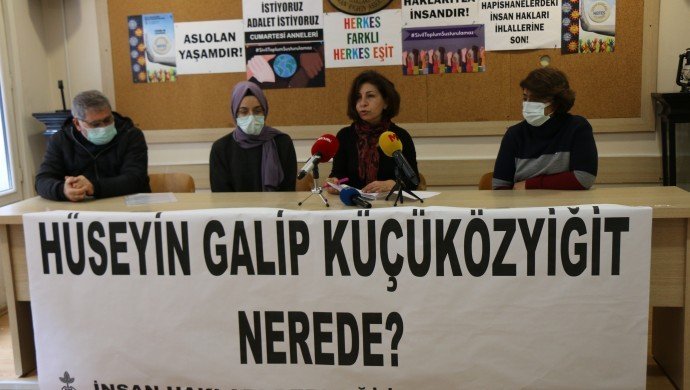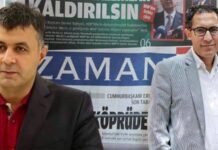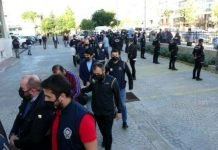The Human Rights Association (İHD) asked Turkish authorities to urgently find Hüseyin Galip Küçüközyiğit, a former bureaucrat who has been missing since December 29, at a press conference they held today together with his daughter Nursena Küçüközyiğit and some members of the group known as the Saturday Mothers.
According to the Mezopotamya news agency, Gülseren Yoleri, head of the İHD’s İstanbul branch, called on the government and the judicial authorities to investigate the case of Küçüközyiğit. “They should urgently find where Hüseyin Galip Küçüközyiğit is by conducting an effective investigation and inform his family,” she said
Nursena said it has been 51 days since her father went missing and that despite contacting all the relevant authorities they had not received any feedback. “The CCTV footage that I was able to obtain was not examined,” she said. “A couple of months ago Gökhan Güneş had been the victim of an enforced disappearance. When he was released, he talked about how he was tortured. I don’t want my father to suffer the same.”
Nursena had posted a video on Twitter on Jan. 3 announcing that her father went missing on December 29. He was supposed to join his daughters for New Year’s Eve. She said they did not hear from him and contacted the police, who did not help them or respond to their questions.
A prosecutor was finally appointed to the case 18 days after Küçüközyiğit went missing. Yet, according to his daughter, the prosecutor decided that there was no need to pursue legal action in the case.
Ayşe Tepe, a member of the Saturday Mothers, a group composed of families of victims of state-enforced disappearances and extra-judicial killings who have been gathering every Saturday in İstanbul’s İstiklal Street for a silent protest since 1995, said enforced disappearances constitute a crime against humanity and asked the public to raise their voices.
“We know these people are tortured after they are abducted,” Tepe said. “No one should remain silent. Küçüközyiğit needs to be found as soon as possible, and enforced disappearances should end.”
Galip Küçüközyiğit was a successful lawyer who served as the chief legal counsel for the Turks Abroad and Related Communities Agency (YTB). He was fired from his job by a government decree in the aftermath of a coup attempt in July 2016. He was later sentenced to six years, three months in prison for “membership in the movement” due to his alleged ties to the Gülen movement, a faith-based group inspired by Turkish cleric Fethullah Gülen. Küçüközyiğit was released from pretrial detention pending appeal.
Turkish President Recep Tayyip Erdoğan has been targeting followers of the Gülen movement since the corruption investigations of December 17-25, 2013, which implicated then-Prime Minister Erdoğan, his family members and his inner circle.
Dismissing the investigations as a Gülenist coup and conspiracy against his government, Erdoğan designated the Gülen movement as a terrorist organization and began to target its members. Erdoğan intensified the crackdown on the movement following a coup attempt on July 15, 2016, that he accused Gülen of masterminding. Gülen and the movement strongly deny involvement in the abortive putsch or any terrorist activity.
Amnesty International issued an urgent call for action on February 1 for the investigation of the suspected enforced disappearance of Küçüközyiğit. In a sample letter provided for use by the public, the Ankara Chief Public Prosecutor’s Office is asked to “ensure a prompt, impartial and independent investigation … to determine the whereabouts of Hüseyin Galip Küçüközyiğit and the circumstances of his suspected enforced disappearance.”
Nearly 30 people have reportedly been abducted by Turkish intelligence since 2016. Most of the abductions targeted members of the Gülen movement. Many of the abductees mysteriously reappeared in police custody in Ankara after six to nine-month absences.
Apparently intimidated, most of them had kept their silence after their reappearance. Speaking at a court hearing in February 2020, one of the abductees, Gökhan Türkmen, revealed that he had been held incommunicado at a black site in Ankara run by Turkey’s intelligence agency and subjected to severe torture during his 271-day stay. Türkmen was the object of threats and was sexually harassed and abused during his enforced disappearance. He also alleged that he was visited in prison and threatened no less than six times by officials who introduced themselves as intelligence officers, pressuring him to retract his allegations of abduction and torture made at the February hearing.
















